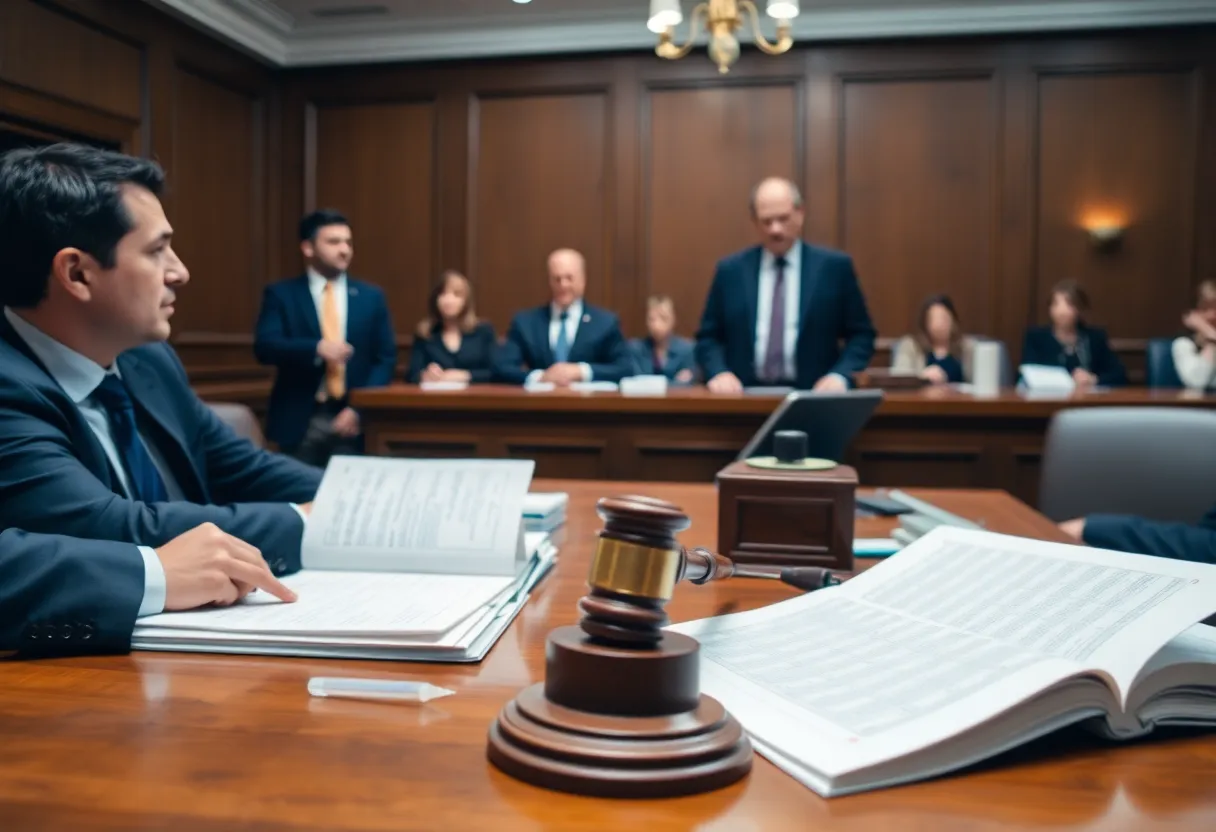

Lawyers and stakeholders engage in a serious discussion regarding the bankruptcy appeal of Bestwall LLC.
Bestwall LLC’s appeal to the US Court of Appeals for the Fourth Circuit questions the legitimacy of its Chapter 11 bankruptcy filing. Critics argue that the financially solvent parent company, Georgia-Pacific, raises ethical concerns surrounding their use of bankruptcy to evade tort liabilities. Ongoing legal battles highlight contentious tactics like the Texas Two-Step strategy, which may set a troubling precedent for solvent companies facing similar claims. As Bestwall prepares for oral arguments, the outcome could redefine corporate responsibility in bankruptcy proceedings, particularly concerning asbestos claims.
In a dramatic play within the legal system, Bestwall LLC is taking its bankruptcy battle to the US Court of Appeals for the Fourth Circuit. This appeal comes as a direct challenge against junior creditors, who include cancer patients claiming they were exposed to asbestos from products manufactured by Georgia-Pacific.
The plaintiffs argue that Bestwall’s Chapter 11 bankruptcy filing is improper, primarily because its parent company, Georgia-Pacific, remains financially solvent. This situation raises critical questions regarding the ethical use of bankruptcy as a tool by solvent companies. The ongoing debate surrounds tactics that involve utilizing a shell company to offload tort liabilities, a strategy that has garnered significant controversy, particularly in asbestos cases targeting victims suffering severe health consequences.
This legal maneuvering is not isolated. A recent ruling in Houston dismissed a similar strategy involving a Johnson & Johnson subsidiary. The judge identified significant flaws in the voting processes employed by talc claimants, casting further doubt on the legitimacy of such tactics in bankruptcy law.
For nearly eight years, Bestwall has been embroiled in attempts to settle thousands of product liability lawsuits related to asbestos exposure. The company’s Chapter 11 bankruptcy gained traction after tort claimants unsuccessfully sought to dismiss the filing in 2024, leading directly to this appeal. With approximately $1.84 billion in dividends paid out last year by Georgia-Pacific, skepticism looms over Bestwall’s claims of financial distress, especially in light of continuing unresolved asbestos claims.
The Fourth Circuit has a history of permitting bankruptcy claims by financially stable companies, a precedent that is now being put to the test. Legal experts are closely monitoring how the court will navigate the jurisdictional and constitutional issues arising from this case, focusing on whether Bestwall’s appeal will be met with favor or dismissal.
Bestwall is not alone in its controversial approach. Units of Trane Technologies Plc are also facing chapter 11 dismissals pushed by asbestos claimants. Both Bestwall and Trane underwent a divisional merger, subsequently filing for Chapter 11 in North Carolina while leveraging the Texas Two-Step strategy. This approach allows for the separation of a company’s liabilities from its assets to safeguard them amid bankruptcy proceedings.
However, some fear that this practice could set a dangerous precedent if solvent companies continue to exploit such tactics in the future. A recent ruling from the Southern District of Texas determined that protections previously assumed under bankruptcy statutes were narrower than claimed by the Johnson & Johnson unit, fueling concerns regarding how future cases might unfold.
As Bestwall contests its bankruptcy status, it faces significant challenges in proving that it can create a confirmable bankruptcy plan that also shields its entire corporate family from related asbestos claims. Previous attempts by the company to bar these claims from Georgia-Pacific and its non-bankrupt affiliates have met with both success and setbacks, complicating its legal landscape.
The appeal, identifiable as In re Bestwall LLC, 4th Cir., No. 24-01493, is set for oral arguments on May 8, 2025. With representation from law firms like Robinson & Cole LLP and Hamilton Stephens Steel & Martin PLLC, Bestwall also finds backing from the US Department of Commerce and a future claimants’ representative.
However, the overarching legal community remains wary. If the appeal proceeds without dismissal, questions loom regarding whether Bestwall can effectively navigate its path through bankruptcy while adhering to traditional legal principles — particularly those that dictate fair treatment and justice for asbestos claimants. The outcome of this pivotal case not only holds the potential for impacting Bestwall and its creditors but could reshape the narrative of corporate responsibility in bankruptcy proceedings moving forward.
News Summary JINYA Ramen Bar has opened its second location in South Carolina, now serving…
News Summary Charleston County Mosquito Control is initiating a major effort to reduce the rising…
News Summary The South Carolina Research Authority (SCRA) has announced the addition of Realize Ascent…
News Summary The Spoleto Festival USA in Charleston, South Carolina, has debuted a new play…
News Summary In a nationwide show of dissent, thousands participated in the 'No Kings' protests,…
News Summary The Medical University of South Carolina (MUSC) has temporarily closed a section of…